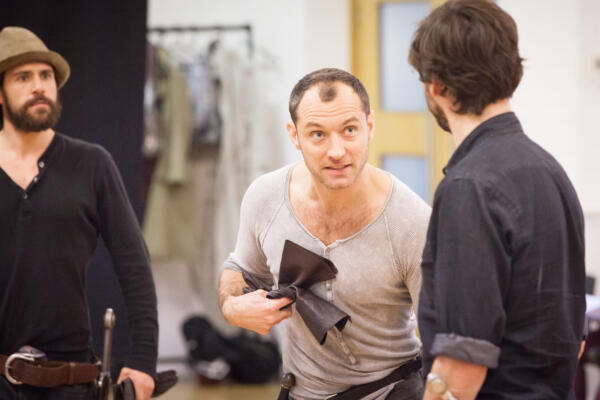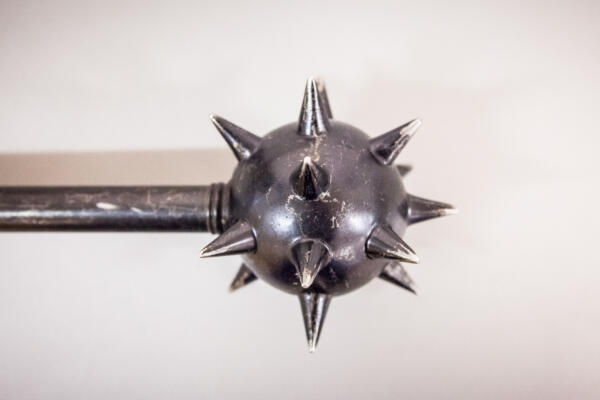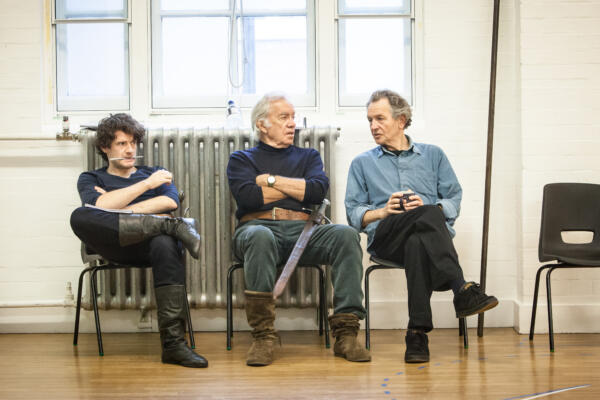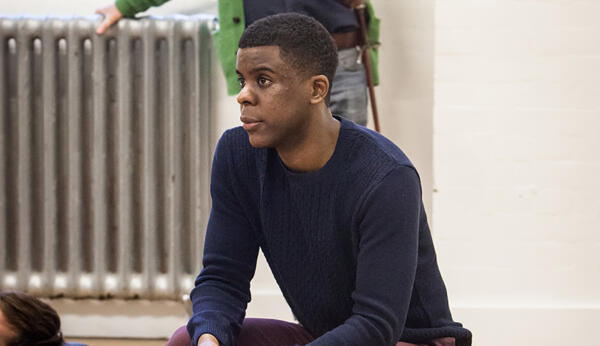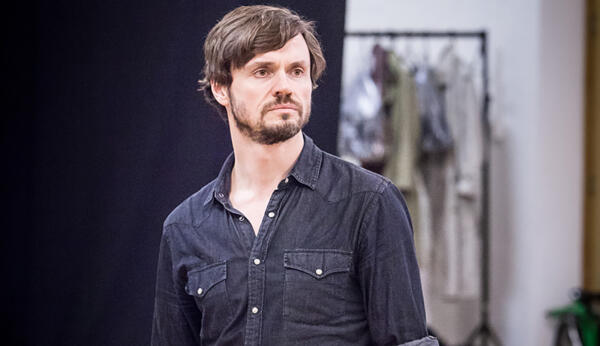Henry V | Inside the Rehearsal Room
Henry V– Week Two, Day One
Having worked through the whole play last week, Michael and the cast are now revisiting each scene and rehearsing them in more detail.
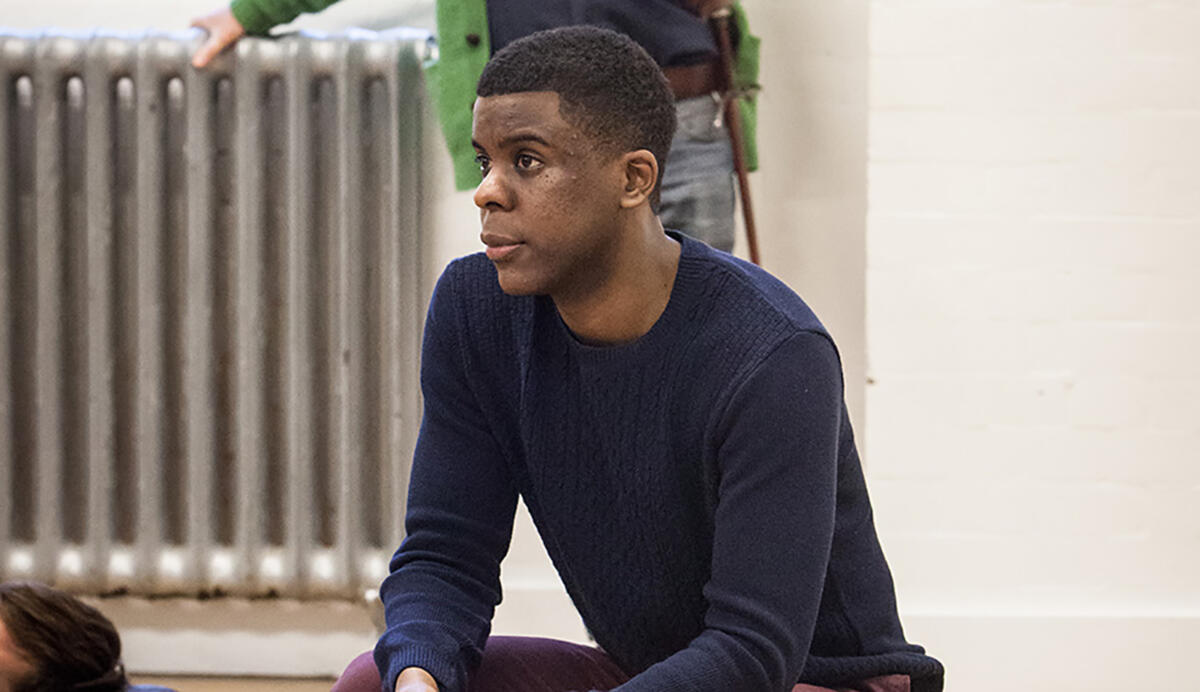
This afternoon’s session begins with a recap of scenes four and six, both featuring the Chorus. Michael wants to ensure Scene Four follows on immediately from the previous scene, which ends with an impassioned speech by Henry. ‘Make sure there’s an invisible thread with his exit,’ he tells Ashley. ‘You come in as he goes.’ Michael considers supporting this with lights and sound – ‘We’ll do a swipe into Eastcheap.’
He thinks the Chorus should take a lead from the passion of Henry’s previous speech: ‘Are you not more convinced at the top? “Now all the youth of England are on fire…” Because of what you and we, the audience, have just seen? Jude Law’s Henry, here and now. You’ve observed your, and our, king. The country could have done one of two things: said, “Oh, no! Not war”. But they don’t. They go, “Yes!”’ Ashley agrees – ‘It’s more active, charged.’
Michael suggests to him: ‘You need to enjoy finding his personality a little more.’ He then gives Ashley some specific notes on the speech: ‘“Now sits expectation…” Bring it down more… Have a view on “silken dalliance”… You could just start a little bit under and a beat extra, to allow for Henry’s exit.’
Working through Scene Six, Michael highlights the Chorus’ reference to ‘three corrupted men’, which is vital to the next scene – ‘Let’s have that. Help us.’
Work then begins on Scene Seven, in which the three corrupted men – Cambridge, Scroop and Grey – are revealed as traitors, having conspired with France to bring about Henry’s downfall. They run the scene once, following which Michael makes several observations, starting with the stage and blocking: ‘It lends itself to adversarial combat because of its width. It helps separate Henry’s loyal followers from the treacherous ones.’
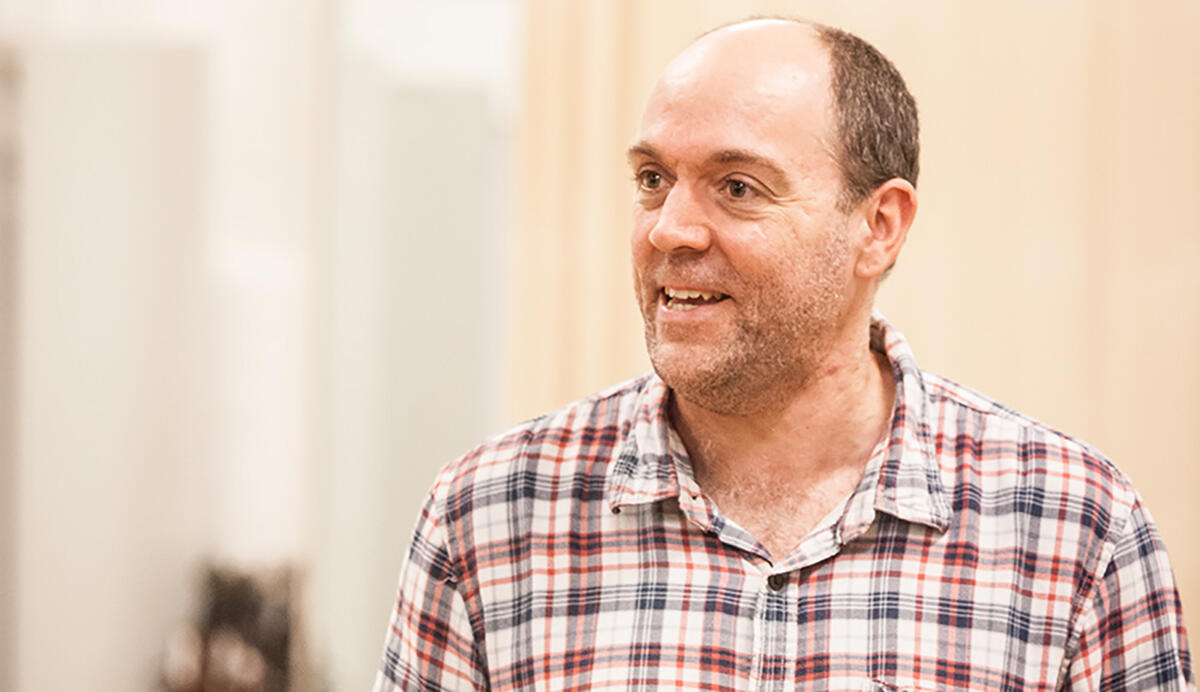
He considers the king’s entrance, saying to Jude: ‘So you could shake their hands, if that’s what you’re doing – be part of them, unnerve them.’ Michael turns to Ian Drysdale, Ben Lloyd-Hughes and Harry Atwell, playing Cambridge, Scroop and Grey: ‘As people who are doing wrong in the name of right, do you carry any of that with you in your demeanor? It’s worth remembering that you’re three very important characters in our narrative, so it’s nice to have all these colours in there.’
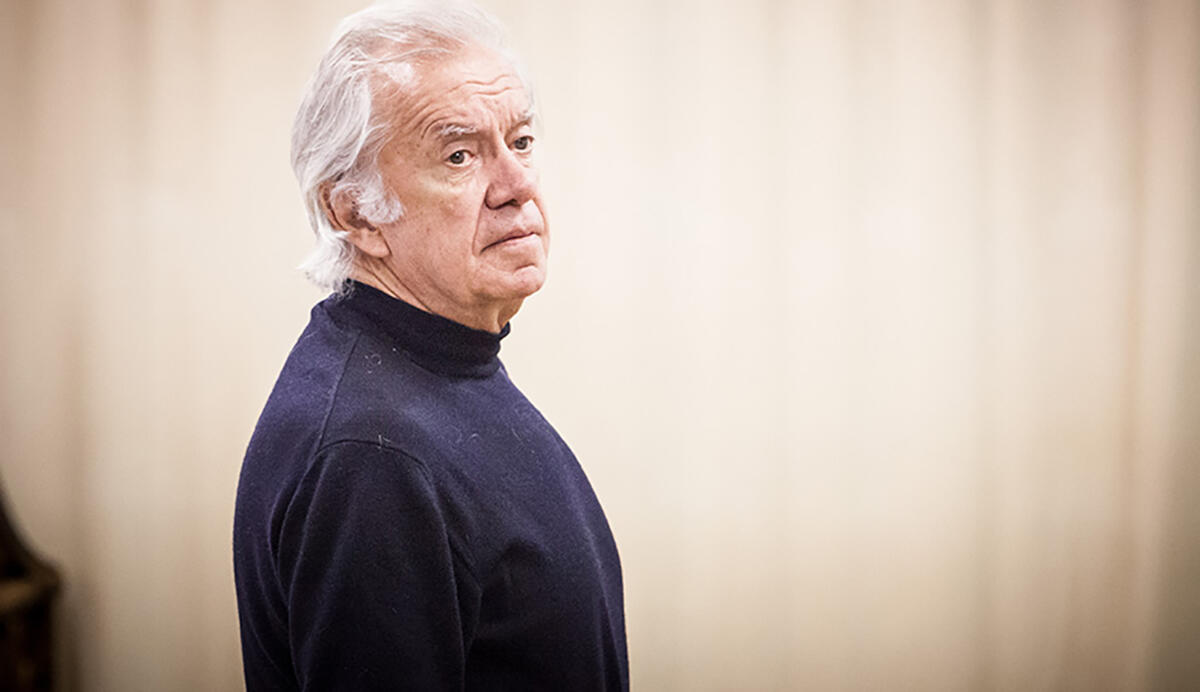
Returning to the text, Michael asks James Laurenson, playing Exeter: ‘Who is the “his” in your line, “the man that was his bedfellow”?’ It’s clarified that this refers to Henry (‘his’) and Scroop (‘the man’), whom Jude describes as ‘the closest of the close friends’. Michael wants to ensure the storytelling is clear among Henry’s loyal followers: ‘It’s tonal, what I’m saying here. The stage is alive with debate. Things like Cambridge’s line could evoke a look – you could help us there. Any help we can have while the king is getting on with the traitors is good.’ Although he warns them against overstating it: ‘We’re not doing nod-nod, wink-wink just yet. Don’t let’s play the “cajunk” moment.’
Michael focuses on Henry’s journey through the scene, with reference to the text: ‘It certainly needs a change of tack, “Uncle of Exeter. / Enlarge the man committed yesterday…” ‘ This introduces the theme of showing mercy to those who have been disloyal to the king. To help him with the interpretation of a line, Michael suggests Jude ‘attach a “why?” to, “Alas, your too much love and care of me…” ‘ Later in the same speech, he encourages him to link ‘French causes’ and ‘the late commissioners’ in, ‘And now to our French causes: / Who are the late commissioners?’ As ever, Michael seeks to make the meaning as clear as possible: ‘How do you help our audience understand who the “late commissioners” are?’
Turning to Cambridge and his co-conspirators, he urges them not to read the papers handed them until Henry instructs them to do so. He particularly likes the way Jude cuts off his own line when seeing their reaction: ‘We will aboard tonight. – Why, how now gentleman! / What see you in those papers that you lose / So much complexion? Look ye, how they change! / Their cheeks are paper.’ ‘I like your invitation to our audience to watch three men going white.’
Michael outlines the traitors’ predicament, explaining that they’ve been handed a signed confession that absolutely proves their guilt, while demonstrating the resourcefulness of Henry’s loyal followers: ‘They’re steps ahead – they’ve got the paperwork, everything. You’ve walked into a trap.’ He notes that Shakespeare hasn’t written much pleading or begging on the traitors’ behalf – ‘No one even tries to run away!’
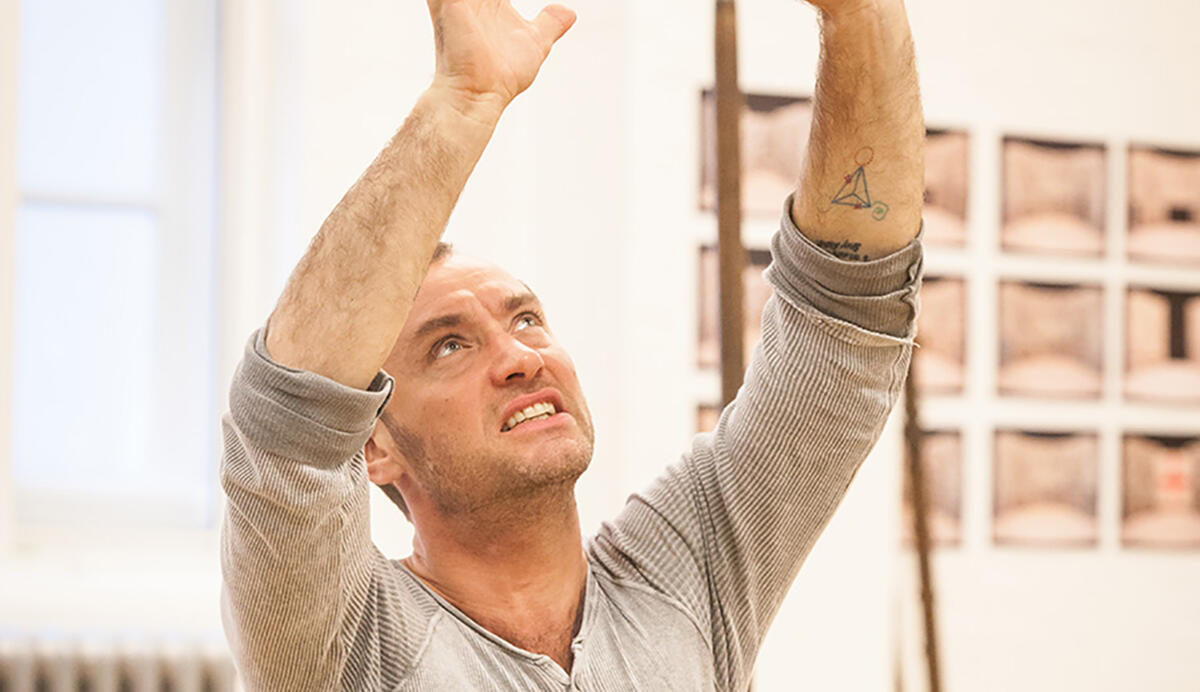
Michael encourages Jude to tear into his speech and the traitors: ‘It’s relentless. Keep going.’ He wonders if all the details are filled in and made clear for an audience? ‘If we listen to it, do we get the back-story of you and Scroop?’ Michael considers Henry’s lines: ‘But O, / What shall I say to thee, Lord Scroop? thou cruel, / Ingrateful, savage, and inhuman creature!’ ‘It’s a deep moment of raw emotion between the two of you.’ ‘For this revolt of thine, methinks, is like / Another fall of man.’ – ‘That’s how huge it is.’ Looking at Henry’s final dismissal of the traitors – ‘God quit you in His mercy!’ – Michael asks: ‘Is there a case for that last speech being, “Oh, shut up!”’
Discussion returns to Henry’s attitude towards himself as king. ‘The idea that you don’t believe in your own legitimacy until you get a sign from God,’ says Michael. ‘That sign is victory at Agincourt – that’s a big theme of the play. Until then, you’re still auditioning.’ Jude comments on Henry’s vulnerability at this point: ‘He’s very mortal and he’s very open.’
Rehearsals continue with a session on Scene Nine, set in the French court. The location is the first detail to be discussed: Is it the court or parliament? ‘Could this be a council chamber with a lot of people present?’ asks Michael. ‘We could add reverb on voices, but my question is: What would be the difference? We’re clearly supposed to go from England to the great debating chamber in France. Or do we make it smaller? My ear tells me it’s written for a bigger space. We just need to decide what that would give us as a benefit.’
He also focuses on relationships. ‘Can I just ask a couple of questions here about building character?’ The dynamic between the characters is discussed: ‘There’s history – “previous” – between the Constable and the Dauphin.’ Michael encourages them to share this back-story with the audience: ‘It’s usually best when you create something on stage for an audience, rather than bringing something on with which we then have to play catch-up.’
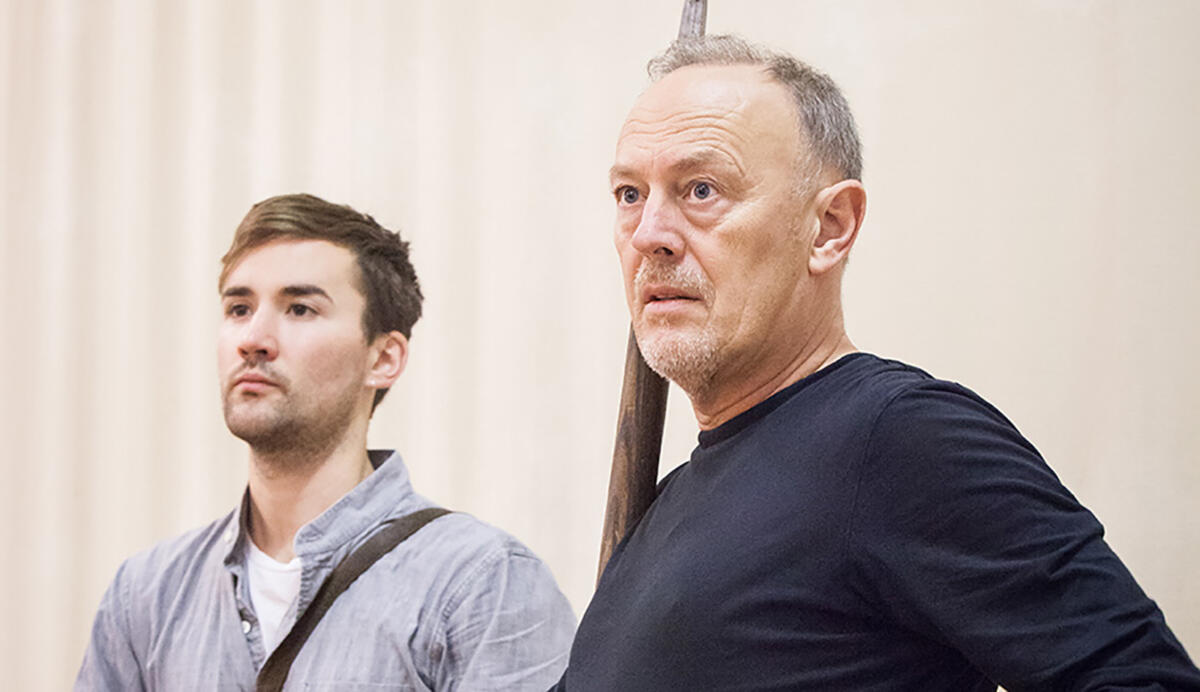
‘Is he a weak man, King Charles?’ Michael asks Richard Clifford. ‘Or just fearful in this moment?’ They consider this, Michael concluding: ‘A man who is rightly fearful in this moment is a good choice. Why wouldn’t he be? It shows his humanity.’ Richard reflects on Charles in relation to the Dauphin: ‘My weakness I show in my relationship with my son.’ Michael questions Charles’ priorities – the ‘king comes first, the father second’? He encourages Richard to keep his monologues alive: ‘Find a way of driving that so it doesn’t end as a speech.’
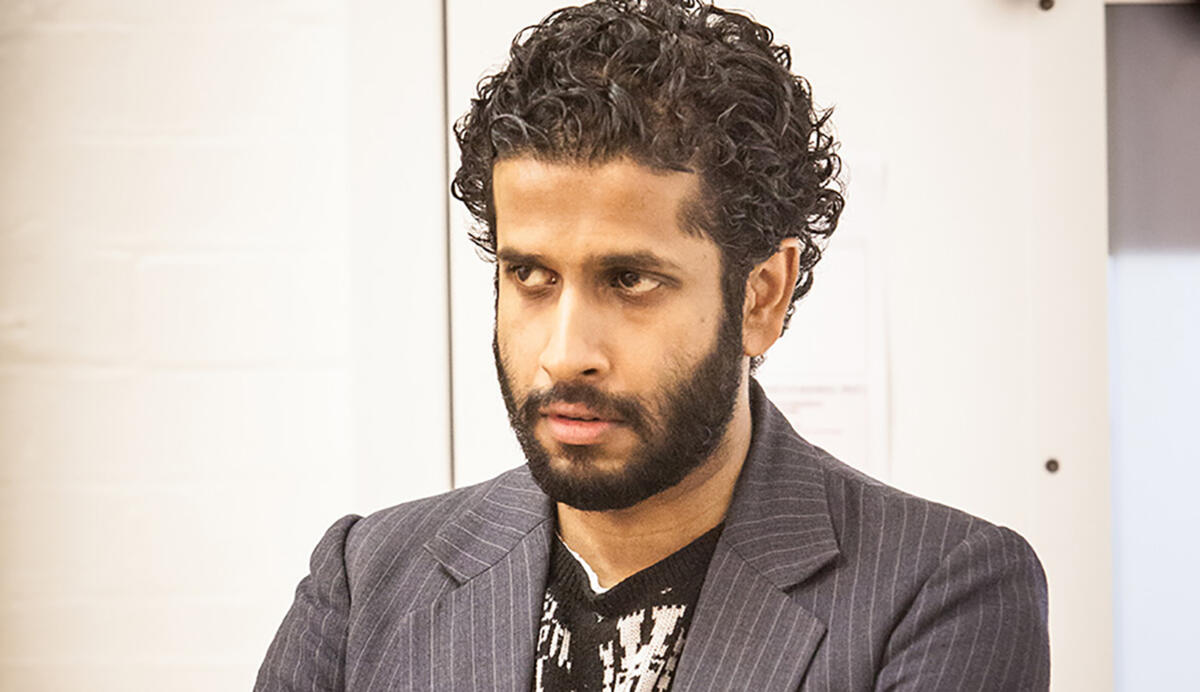
Looking at other moments in the scene, Michael suggests to Prasanna Puwanarajah, playing Montjoy, that he should be ‘oblivious to what’s going on’ between Charles and the Dauphin. He also advises Ben, as the Dauphin, that, ‘“Turn head, and stop pursuit” is a snatched moment before Exeter arrives’. Michael wonders who Exeter delivers his documents to? Charles or one of his followers? ‘Has the King of France already made a deal with the English?’ he asks. The consensus among the cast is ‘not yet’.
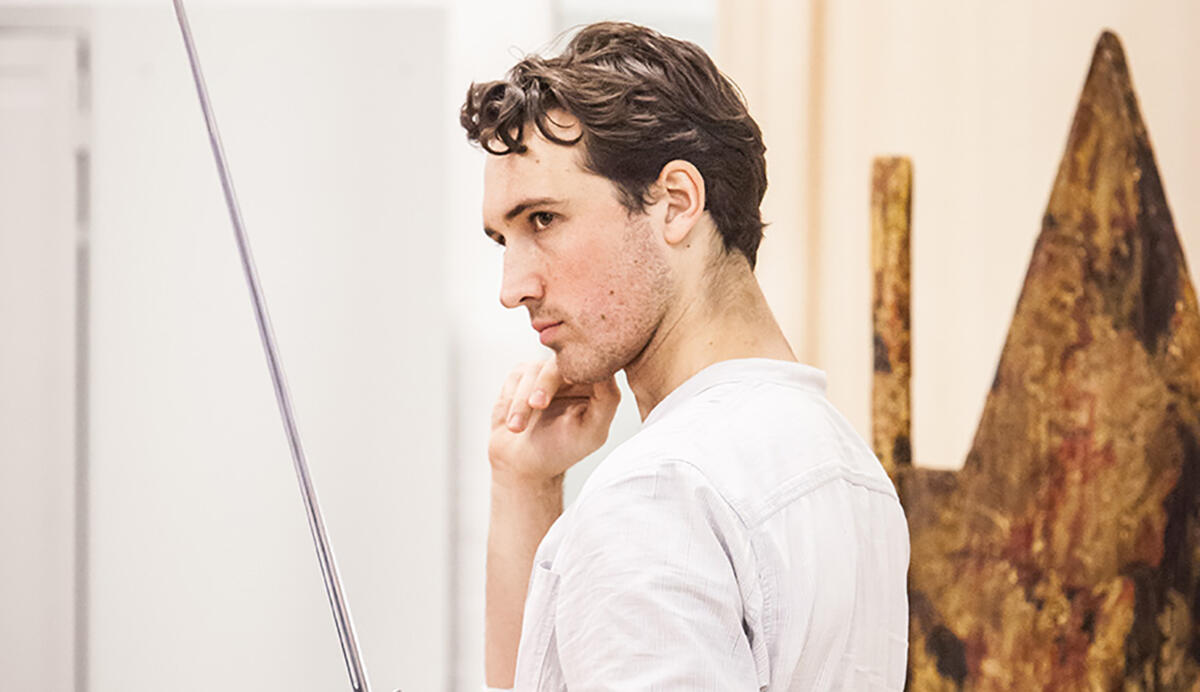
He encourages all the actors to wrestle the sense from the lines, commenting to James Laurenson (Exeter): ‘The invisible chord gets dropped between “message” and “unless” in, “This is his claim, his threat’ning, and my message; / Unless the Dauphin be in presence here…”‘ Michael reflects on the Dauphin’s rash reply to Exeter: ‘This guy’s a loose canon. He admits to the enemy that he and his father are at odds.’
Michael always approaches a scene from several different angles – ‘Can we just try a version where…’ – making sure everyone understands what they’re doing and saying: ‘Clarity. Anything in there that anyone’s unclear about?’ Michael’s happy with where they’ve got to by the end of the session, having something to return to. ‘I think it’s always best to leave the discussion in the air,’ he says. ‘To go away, let it percolate, then come back later and attack it.’
The next session returns to scenes six and ten, featuring the Chorus. Starting with Scene Six, Michael reflects on the difference between this Chorus scene and the previous ones: ‘This is taking us on for once, rather than commenting on something that’s gone before.’ The focus shifts at the beginning – ‘Now it’s “The French”, as opposed to this lot, the English, going off.’
He thinks it a very compacted scene: ‘This one just feels like a lot of info. It almost needs an, “OK, listen up…” at the beginning.’ Michael wonders whether he and Adam should create something to help this? Before rejecting the idea in favour of Ashley himself – ‘No, you’re the link.’
Michael encourages him to maintain the stillness and focus – ‘Not too much flitting around.’ He advises Ashley to drive through the speech, commenting that the Chorus is always on the front foot: ‘He’s not a contemplative character.’ He then works through the speech with Ashley, commenting on specific lines: ‘“And three corrupted men…” Tonally it’s being a little bit huge and it needs to be a little more colloquial – help us. Away from France, big countries, to individuals… I think it’s good that you remind us, the audience, that you represent us. “O England!” A line for now, with all our Europe thing. It’s still pertinent. Set that little bit of tension more, for the dramatic purposes of this play – we might not win. Otherwise there’s no tension to our narrative… I think “hell” and “treason” you need to pick out more.’
Michael works with Ashley to get the sense of the lines. ‘Take out those dashes for a moment, we lose the thread otherwise. Punctuation is the enemy in Shakespeare.’ As an idea, he proposes typing up a Shakespearean play without any punctuation in it at all, allowing the actors to add it instead.
Ashley then runs Scene Ten, following which Michael gives notes. ‘A little bit too fast, if I’m honest. Because we’re only in the second week, the words aren’t quite catching up with the thoughts.’ He focuses on specific words and phrases: ‘“Follow, follow!” A gear change to something more focused. Re-group with us, it needs something more rooted.’ Michael describes the Chorus’ use of the word ‘suppose’ as ‘an invitation to imagine’. Later he thinks he gave Ashley a ‘bum steer’ by suggesting a pause or beat before ‘Follow, follow!’ – ‘It’s all the same thing.’
By the end of the session, Ashley is beginning to feel the frustration of not having other actors or an audience to interact with, but Michael’s pleased with his progress: ‘Good, Ashley, you’re making complete sense of it – the speeches are taking shape. We just have to make sure we don’t peak too early.’ He gives him one last piece of advice: ‘Remember you’re talking to somebody. I know you’re talking to nine hundred people, but you have to start with just one person.’
